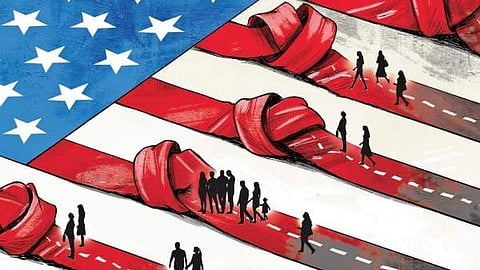

Donald Trump, the Republican presidential candidate, is projected to win the 2024 Presidential Elections in the United States of America, furthering concerns about more stringent visa processes for immigrants, particularly skilled immigrants on H-1B visas and their families.
These concerns exist based on Trump’s track record on immigration during his first term as POTUS (President of the United States), from 2016 to 2020.
Trump's first term oversaw a significant rise in H-1B visa denials and Requests for Evidence (RFEs), which increased uncertainty for highly qualified individuals, reports Hindustan Times.
H-1B denial rates were almost 18 per cent between 2016 and 2020, while they were only 3.2 per cent during the Biden administration.
Likewise, under Trump, the RFE rate almost tripled, rising from about 12 per cent to 34 per cent.
According to the Hindustan Times, the process may become more stringent under the second Trump Administration, likely leading to an increase in denial rates, making it more difficult for high-skilled immigrants and international students to find or keep a job.
In 2020, Trump's Department of Labour proposed a rule that increased the minimum salaries for H-1B visa holders and green card applicants, requiring companies to pay more than $200,000 in some roles in particular cities, regardless of the candidate's level of expertise.
Although a judge ultimately struck down this rule, Trump 2.0 may pursue similar tactics in the future, potentially pricing many foreign experts out of the US job market.
However, Trump also stated in a podcast appearance as part of a campaign that his administration would grant an automatic green card to all graduates from US colleges, if elected.
